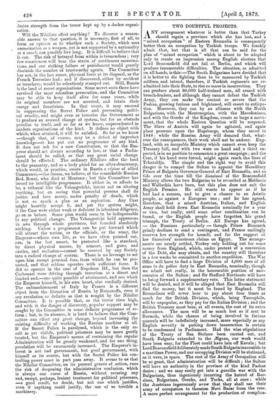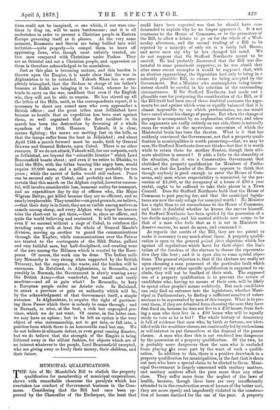TWO DOUBTFUL PROJECTS. A NY arrangement whatever is better than that
Turkey should regain a province which she has lost, and a "mixed occupation" of Eastern Roumelia is consequently better than an occupation by Turkish troops. We frankly admit that, but that is all that can be said for the plan of " mixed occupation " which is about to be adopted only to create an impression among English electors that Lord Beaconsfield did not fail at Berlin, and which will produce innumerable difficulties. The situation, as admitted on all hands, is this:—The South Bulgarians have decided that it is better to die fighting than to be massacred by Turkish soldiers, and intend, therefore, if Turkish regiments are re- admitted into their State, to rise en masse in insurrection. They can produce about 80,000 half-trained men, all armed with breech-loaders, and although they cannot defeat the Turkish Army, they can make the contest so severe that the Pashas, growing furious and frightened, will resort to extirpa- tion. Moreover, they can by an alliance with the North Bulgarians, with the Montenegrins, with the Macedonians, and with the Greeks of the Kingdom, create so large a move- ment, that the whole Eastern Question will be reopened. The Slays of Austria will again be agitated, and again place pressure upon the Hapsburgs, whom they saved in 1848 ; while the Russian Army will demand that, what- ever the consequences, their work shall not be undone. Eng- land, with an incapable Ministry which cannot even keep the Treasury full, and with two wars on hand and a third ex- pected, is in no position to commence a great campaign ; and the Czar, if his hand were forced, might again reach the lines of Tchataldja. The simple and the right way to avoid this danger is to compel the Sultan to appoint the Hereditary Prince of Bulgaria Governor-General of East Roumelia, and so tide over the time till the dismissal of the Beaconsfield Ministry allows the two Bulgarias to be re-united as Moldavia and Wallachia have been, but this plan does not suit the English Premier. He still wants to appear as if he had had a success, and to give a chance to an Asiatic people, as against a European one ; and he has agreed, therefore, that a mixed Austrian, Italian, and English Army shall hold down East Roumelia nominally for a year or two, but really, until some other combination can be found, or the English people have forgotten his grand triumph, the Treaty of Berlin. All Europe has agreed, — the Russians particularly — though Prince Bismarck grimly declines to send a contingent, and France smilingly reserves her strength for herself, and for the support of her financiers' monstrous claims on Egypt. The arrange- ments are nearly settled, Turkey only holding out for some money from England, which, under pretext of a conversion of the Debt, she may obtain, and the country will therefore in a few weeks be committed to another expedition. The War Office will have to find a large Division of 4,000 men of all arms to do police duty in East Roumelia, nominally, though we admit not really, in the honourable position of mer- cenaries of the Sultan ; and Sir Stafford Northcote will have to bring forward a supplementary vote. This latter statement will be denied, and it will be alleged that East Roumelia will find the money, but it must be found by England. The Roumelians will never bear to pay about four times as much for the British Division, which, being Turcophile, will be unpopular, as they pay for the Italian Division ; and the British Treasury must bear, at all events, the cost of its extra allowances. The men will be as much lost as if sent to Burmah, while the chance of being involved in furious quarrels will be indefinitely increased, more especially as any English severity in putting down insurrection is certain to be condemned in Parliament. Had the wise stipulations of the Treaty of San Stefano been carried out, and South Bulgaria extended to the .gean, our work would have been easy, for the Fleet could have lain off Kavala ; but Lord Beaconsfield deliberately made South Bulgaria inacessible to a maritime Power, and our occupying Division will be stationed, as it were, in space. The cost of the Army of Occupation will be so great, that administration will be difficult ; the Sultan will have no authority in the province of the kind Pashas desire ; and we may easily get into a guerilla war with the Bulgarians, thus ingeniously incurring the hatred of Rue- slang, Bulgarians, Greeks, and Turks, all at once ; while the Austrians ingenuously avow that they shall use their army of occupation to threaten Novi Bazar from the rear. A more perfect arrangement for the production of complica- tions could not be imagined, or one which, if our wars con- tinue to drag on, will be more burdensome ; and it is all undertaken in order to prevent a Christian people in Eastern Europe governing itself as it pleases. At the very same moment, Roumania and Servia are being bullied into wild irritation—quite properly—to compel them to leave off oppressing Jews, who, though most unfairly treated, are free men compared with Christians under Pashas. They are an Oriental and not a Christian people, and oppression on them is therefore acknowledged to be scandalous. Just as this plan is becoming mature, and this burden is thrown upon the Empire, it is made clear that the war in Afghanistan is to be extended. Yakoob Khan has so com- pletely triumphed, that the Sirdars in charge of his father's treasure at Balkh are bringing it to Cabul, whence he in- tends to carry on the war, confident that even if the English win, they will not be able to remain. He has stirred up all the tribes of the Hills, until, as the correspondents report, it is necessary to shoot any armed man who even approaches a British officer ; and the great tribes near Jellalabad have become so hostile that an expedition has been sent against them, so well organised that the first incident in its march has been the destruction by drowning of a whole squadron of the 10th Hussars. Yakoob, it is clear, means fighting ; the snows are melting fast on the hills, so that the troops suffer from the heat in Jellalabad ; and about April 15th a march forward must be made, both by General Browne and General Roberts, upon Cabul. There is no other resource. If we do not attack,Yakoob will, for our outposts, such as Jellalabad, are beyond the " scientific frontier" which Lord Beaconsfield boasts about ; and even if we retire to Dhakka, to hold the Hills, with the tribes buzzing like angry bees, would require 10,000 men, and a million a year probably for ten years ; while the unrest of India would still endure. Peace can be secured only at Cabul, and probably not there. It is certain that this march on the Afghan capital, however success- ful, will involve considerable loss, immense outlay for transport, and an expenditure day by day of officers who, like Major Wigram Bettye, get killed because they are so efficient, and so nearly irreplaceable. They consider—on good grounds, we believe, —that their duty is in front, they are as visible among natives as camels among sheep, and every Afghan who hopes for heaven tries the short-cut to get there,—that is, slays an officer, and quits the world believing and contented. It will be necessary, even if we succeed without a siege of Cabul, to reinforce the invading army with at least the whole of General Maude's division, moving up another to guard the communications through the Khyber, while communications over the Peiwar are trusted to the contingents of the Sikh States, gallant and very faithful men, but half-disciplined, and creating none of the awe among the Hillmen which is created by the Euro- peans. Of course, the work can be done. The Indian mili- tary Monarchy is very strong when supported by the British Treasury, but the expense, the waste, and the burden will be enormous. In Zululand, in Afghanistan, in Roumelia, and possibly in Burmah, the Government is slowly wasting away the British Army—that wonderful, but small and costly machine—and all to gain what ? In Roumelia, to keep a European people under an Asiatic rule. In Zululand, to annex a province or gain an authority which will be, by the acknowledgment of that Government itself, a simple nuisance. In Afghanistan, to acquire the right of garrison- ing three Passes which there is nobody to come through ; and in Burmah, to seize, at the best, a rich but unpeopled pro- vince, which we do not want. Of course, in the latter case, we may have no option ; but to be left an option is the very object of wise statesmanship, not to get into, or fall into, a position from which there is no honourable road but one. We do not believe in ultimate defeat, or even great coming disaster, but we do believe that the strength of the Empire is being frittered away in the silliest fashion, for objects which are of no interest whatever to the people, Lord Beaconsfield excepted, who are giving away so freely their money, their children, and their future.



































 Previous page
Previous page